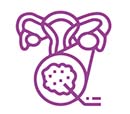PCOS AND IT’S TREATMENT
PCOS (polycystic ovarian syndrome) is a hormonal condition that affects many women of reproductive age. Women with PCOS may have irregular or prolonged menstrual cycles, insulin resistance as well as high levels of the male hormone androgen. The ovaries may produce a many small cysts (fluid filled sacs) and fail to release eggs on a regular basis.
Causes
Cause of PCOS is unknown. Most experts think that several factors, including genetics, could play a role
Symptoms: – Women with following symptoms needs PCOS treatment
- Irregular menstrual cycles (cycle of 40-60 days).
- Inability to conceive.
- Inconsistent or excessive bleeding during menstruation.
- Acne, hirsutism, and other skin conditions (hair growth on face, chest, abdomen).
- Male pattern baldness
- Weight gain
- ACANTHOSIS NIGRICANS (dark velvety patches on the skin of the neck, elbows, and inner thighs)
Treatment of PCOS
- Lifestyle modification- Daily exercise and a proper diet along with medical treatment is necessary for PCOS treatment
- Birth control pills (women who do not want pregnancy)
- Helps to regularize periods
- Acne and hirsutism-They will stop new hair development but will not affect existing hair growth
- Progesterone tablets are provided to women who do not have regular periods.
- Metformin: it is an insulin sensitizing agent.
- Inositol supplements: they can help you fight against insulin resistance.
Pcos And Infertility
PCOS is the most common cause of female infertility because of Anovulation (no ovulation).
- Ovulation Induction:- Medicines and injections are used to mature and release the egg during ovulation induction. Simultaneously, the patient is scheduled for frequent serial ultrasound appointments (follicular monitoring) to see if the follicle (which contains egg) is growing properly and to monitor its rupture. We advise the patient to have natural intercourse for two to three days after the follicle has ruptured. Ovulation induction and IUI can be done altogether.
- IUI (Intrauterine insemination):- a husband’s sperm sample is washed in a lab. The egg size is measured using an ultrasound. When the egg is released, the semen (washed sample) from the husband is transferred in the uterus of the wife. After two weeks, a urine pregnancy test is used to confirm the pregnancy
- IVF (In-Vitro Fertilization):- Sperm and eggs are fertilised outside the body to form an embryo in this procedure. The embryos are then implanted in the uterus. The success rate is 50-60%. A fresh transfer is not possible in PCO patient owing to the risk of ovarian hyper stimulation (abdominal discomfort, vomiting, and fluid collection in the belly), so the embryos are frozen.
What do we expect from you ?
- LIFESTYLE CHANGES
- Exercise, walking improves insulin resistance
- Reduction of even 10% body weight can lead to improvement of menstrual cycle & fertility.
- DIET MANAGEMENT

Frequently asked questions
Q1. What is PCOS?
Ans:- PCOS (polycystic ovarian syndrome) is a hormonal condition that affects many women of reproductive age. Women with PCOS may have irregular or prolonged menstrual cycles, insulin resistance as well as high levels of the male hormone androgen.
Q2. How do I know if I have PCOS?
Ans:- There is no single test to diagnose PCOS. Your doctor will take the following steps to diagnose the exact cause:-
- Medical history of symptoms and menstrual periods
- Physical Examination (Blood pressure, Body mass index [BMI], waist size, weight and areas of increased hair growth).
- Pelvic examination- Ovaries are monitored by ultrasound to check for any cyst and endometrium (uterus) lining.
- Blood tests (Blood sugar and androgen levels are checked)

